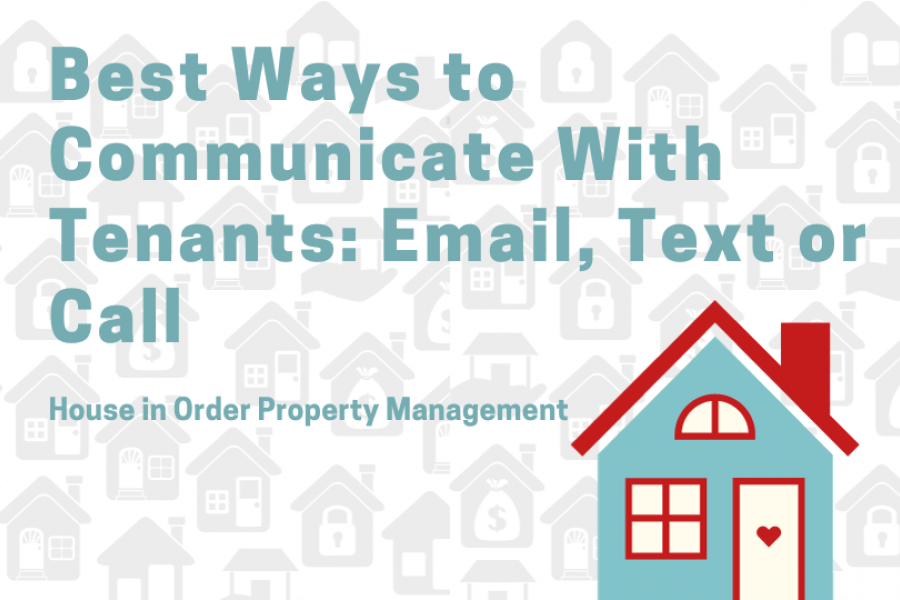
Effective communication is crucial for landlords to maintain a positive and transparent relationship with their tenants. Among the various communication channels available, such as email, text, and phone calls, choosing the right one can significantly impact your landlord-tenant dynamic.
In this article, House In Order Property Management will explore the best ways to communicate with tenants, looking into the advantages of when to call, when to email, and when to text. Additionally, we'll address the legal implications of each communication method and provide best practices for landlords to enhance their tenant interactions.
When to Call Tenants
While technology offers alternative means of communication, there are cases where a phone call remains the most effective method. Urgent matters, such as emergency maintenance issues or immediate lease concerns, warrant a direct and immediate line of communication.
Phone calls allow for real-time dialogue, enabling you to address matters promptly and ensure a quick resolution. Additionally, some tenants may prefer a phone call, especially when discussing sensitive topics or negotiating terms.
Guidelines for Effective Phone Communication with Your Tenants
When calling tenants, it's crucial to be mindful of their schedules. Avoid calling during late hours or at times when they are likely to be at work. It is important to avoid reaching out during late hours. By respecting their time, you can demonstrate a thoughtful approach that contributes to a professional interaction.
.jpg)
You should be clear and concise in your communication, providing all necessary details. Respectful and professional communication sets the tone for a positive landlord-tenant relationship.
This professional approach creates confidence in tenants, assuring them that their landlord values their time and strives for transparent communication. Ultimately, the implementation of these best practices for calling tenants contributes significantly to a positive landlord-tenant dynamic, enhancing overall satisfaction and cooperation in the rental arrangement.
Is Verbal Communication Legally Binding?
While phone conversations can serve as valuable communication tools, it's essential to understand their legal implications. In most jurisdictions, verbal agreements are binding, but proving the details of such agreements can be challenging. To safeguard both parties, important lease terms and agreements should be documented in writing.
When to Email Tenants
Email is a versatile and widely accepted form of communication that allows you to convey detailed information, documents, and notices to tenants easily. Important lease updates, policy changes, or routine announcements can be efficiently communicated through email.
This method provides a written record of communication, reducing the likelihood of misunderstandings and offering a convenient reference point for both parties.
Guidelines for Effective Email Communication with Your Tenants
In today's digital era, email is a vital tool for landlords to communicate effectively with tenants. It's crucial to use a professional and polite tone in email exchanges to create a positive landlord-tenant relationship.

You should use clear and direct language clearly stating the purpose of the email, whether it's about lease renewal, maintenance updates, damage repairs or general information, to help tenants understand the context, reducing the chance of misunderstandings.
In conclusion, successful email communication for landlords involves a blend of professionalism, clarity, and simplicity, creating a communicative environment that strengthens the tenant-landlord relationship.
Are Email Notifications Considered Legal Written Documentation?
In many jurisdictions, email notifications are considered legally binding, especially when they contain critical information related to the rent, lease agreement or property regulations. You should consistently use email for official communication and retain records of all correspondence for future reference.
When to Text Your Tenants
Text messaging is a quick and direct way to communicate, having an open rate, particularly for brief updates or reminders. Texts are often read promptly, making them suitable for time-sensitive information.
Whether it's a maintenance appointment reminder or a simple check-in, texting provides an informal yet efficient means of communication.
Guidelines for Initiating Text Communication with Your Tenants
Before you start texting your tenants, make sure to get their permission and create clear rules for texting. Texts should be reserved for concise, non-urgent matters. Ensure that your messages are clear and respectful, avoiding any language that may be misconstrued.
.jpg)
Once you have their permission, establish guidelines. Tell your tenants that texts are for quick updates, and important or complex issues will still be discussed through official channels. Setting these boundaries helps tenants understand when to expect a text and encourages them to respond promptly.
Keep your text messages clear and polite, avoiding any confusing language. Following these guidelines allows you to benefit from text communication while keeping interactions professional and clear.
Are Text Notifications Considered Legal Written Documentation?
While text messages may not be as formal as emails, they can still serve as documentation in certain circumstances. However, their legal standing may vary and it's advisable to consult local laws. For critical matters, it's recommended to follow up on important information shared via text with an official written communication, such as an email.
Final Words
In conclusion, the best way to communicate with tenants depends on the nature of the message and the urgency of the situation. Phone calls are suitable for urgent matters, while emails offer a comprehensive and legally recognized form of communication. Texts can be valuable for quick updates but should be used judiciously.
House In Order Property Management can help you navigate the intricacies of tenant communication. We understand the importance of effective communication and offer comprehensive solutions to streamline landlord-tenant interactions.
Contact us today to learn more about our services!
